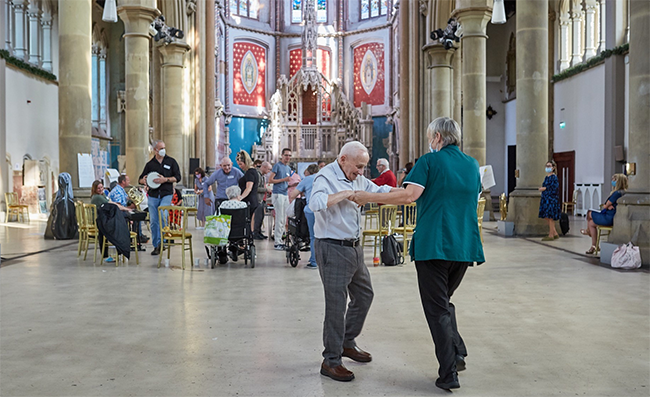A new model of working with partners in the 10 Greater Manchester boroughs, that addresses social inequalities and increases access to arts, culture and music.
The challenge
Based at the Grade II-listed Monastery in the heart of Gorton, East Manchester, Manchester Camerata is a world-class chamber orchestra of professional freelance musicians.
For over 12 years we’ve delivered our evidence-based programme, Music in Mind, in partnership with The University of Manchester, reaching over 10,000 people affected by dementia, including Music Cafes for all those affected by dementia. We also have over 10 years’ experience of delivering high quality music-making sessions with school children across Greater Manchester, Merseyside, Cumbria, Cheshire and Yorkshire, and now young people in OnSide Youth Zones.
We want to create creative music-making workshops and intergenerational events, using music as a means to break down barriers, and finding ways to create long-term sustainability and legacy through partnerships with local councils and clinical commissioning groups (or integrated care systems).
By 2030, we want every person with dementia and every young person in Greater Manchester to have access to world-class music-making – this is our Social Impact Plan.
The solution
This vision and our plan was inspired by the Greater Manchester Inequalities Report and we aim for this work to be a national model and exemplar, as illustrated in the Power of Music report.
We have evidence that our model - Consulting, Collaborating and Creating with local community groups – really works.
In our 10-year ‘Classically Yours’ partnership with Orchestras Live in Withernsea, East Riding of Yorkshire, we have reached over 1,550 people in schools, care settings and choirs. Giving the community a stake in the cultural offer brings a community together and reaches new audiences as well as supporting community cohesion. For participants, qualitative feedback has guided our offer to these communities, and consistently shown that taking part has increased confidence, developed skills and broadened musical horizons. Without Classically Yours, these types of musical opportunities would simply not available to people in the East Riding.
We now intend to replicate this model in all 10 boroughs of Greater Manchester, starting with Gorton, Rochdale and Oldham.
This is a new model of working with partners in Greater Manchester (GM). We work with our councils, clinical commissioning groups (newly-formed integrated care systems) and communities to build programmes that understand and reflect local needs. We’ve been funded by councils across Greater Manchester for years and are used to working closely with councils and long term strategic partners. We listen closely to their long-term plans.
Outputs for example are:
-
creative workshops in a group of schools (including a continuing professional development session for teachers)
-
creative workshops with the local Onside Youth Zone
-
weekly Music in Mind/dementia music café sessions
-
two intergenerational concert/events with a 13-piece orchestra.
Our Aims are:
The impact
For participants in our Creative Workshops
-
address important issues important to them through composition and performance
-
increased confidence, building new relationships outside of usual friendship groups
-
self-identify talent that they may not have known they had
-
increased awareness of potential educational/career horizons and aspirations (which may also include a qualification, BTEC/AQA qualification).
For people living with dementia participants of our Music Cafes
-
quality of life is improved
-
ability to communicate and socially interact is improved, enhanced by musical interaction
-
increased confidence in expressing oneself musically
-
quality of their daily care is heightened
-
relationships with their carers are improved
-
mental and physical wellbeing is positively impacted
-
regular attendance leads to an improved mood, reduced levels of anxiety and repetitive behaviour.
For carers and people with dementia participating in our Music Cafes
-
they experience more self-confidence
-
improved mental wellbeing
-
less social isolation
-
make new connections with others in a similar situation
-
find new ways to connect with their loved ones using music.
The long-term impact of our work would be:
-
embedding a culture of arts as health and wellbeing in each borough
-
bringing disparate communities together using music as the common ground
-
creating job opportunities in each local borough, tied to us as an arts organisation
-
communities helping us understand their needs, which in turn helps to develop and widen our musical offering as a musical organisation.
How is the new approach being sustained?
It’s only by long-term support (both financial and co-operationally) from council funding/integrated care systems that these activities can be sustained.
As an orchestra, a charity with a tiny administrative team (with big aims!), we require a mixture of both funding, enthusiasm and willingness from local councils etc. to fundraise towards the activities that will be delivered.
Lessons learned
We’re still all learning! Most importantly, it’s to have backing from a local council that supports our work, knows the importance of music (and the arts) and its benefits and is able to put into play what they need, and is able to articulate what the need of its residents are, and how to play the long game and embed elements into their communities to enable self-sustainability. Good communication networks too – there are many different stakeholders, so a central person co-ordinating this work would help us negotiate our way around, especially as an organisation coming from outside local government walls.
Contact
Lizzie Hoskin, Head of Community, Manchester Camerata
Email: [email protected]
Find out more on Manchester Camerata's website.

